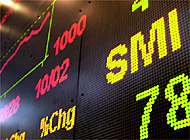Swiss market benefits from global turbulence

The year 2000 saw great swings on the world's stock markets with many registering heavy gains and losses. The Swiss market, though, was one of the world's star performers.
Few markets finished the year higher than in 1999 as the collapse of confidence in the high-tech sector took its toll.
But the main beneficiary of the swing back to old economy blue chips has been Switzerland’s stock exchange.
In recent years, the Swiss Market Index (SMI) has lagged behind its European counterparts as old economy stocks remained out of fashion. But this year the SMI caught up, following the hi-techs’ fall from grace in March.
In fact, the Swiss bourse was the world’s third best performer in 2000, behind China and Ireland. It gained 5.4 per cent, easily outperforming all its continental competitors.
“We all remember the beginning of the year when the SMI was absolutely out of favour,” Bank Leu trader, Eleanor Sharraz, told swissinfo. “But when the NASDAQ turned down, interest came back into the Swiss market which is full of defensive stocks such as pharmaceuticals, food and finance companies.”
Despite the fall of hi-tech stocks in March, it was a technology company which topped the table. For the third year running, Kudelski was the best performer in the SMI, despite losing 20 per cent of its value since March. Over the whole year, the value of its equity was up 140 per cent.
In second place was the biotechnology company, Serono, which also had a very strong first few months before going into retreat.
After March, old-fashioned stocks such as Nestlé, UBS, Zurich Insurance and Novartis led the SMI’s leap forward.
The SMI’s biggest disappointment of the year was the telecommunications company, Swisscom.
“They were the top shots early on but suffered from the high price paid for UMTS licences in the UK and Germany,” says Sharraz. “There are also fears about the debt burden of telecom companies and the erosion of their profit margins.”
However, most analysts believe the telecommunications sector will eventually bounce back and that it remains a good long-term investment.
As the markets look toward to another year of trading, the dominant theme of the first few months is likely to remain the economic uncertainty in the United States.
The American economy is showing signs of a slowdown after its longest-ever period of sustained growth. The president-elect, George W Bush, has even warned Americans that the economy may be on the verge of a recession.
Paradoxically, the uncertainty will probably benefit the Swiss market, at least in the short term. “As long as this doubt exists, it’s good for the Swiss market because investors will be looking for defensive stocks,” says Sharraz.
In December, the SMI has been consolidating around the 8000 mark. Many traders expect it to move upwards to 8400 in the first few months of the year but longer term forecasting is more difficult.
If there is a global recession then all stock markets will fall. But if the US escapes a hard landing the SMI could reach a record high of about 8,600 by the end of 2001.
by Michael Hollingdale

In compliance with the JTI standards
More: SWI swissinfo.ch certified by the Journalism Trust Initiative
You can find an overview of ongoing debates with our journalists here . Please join us!
If you want to start a conversation about a topic raised in this article or want to report factual errors, email us at english@swissinfo.ch.